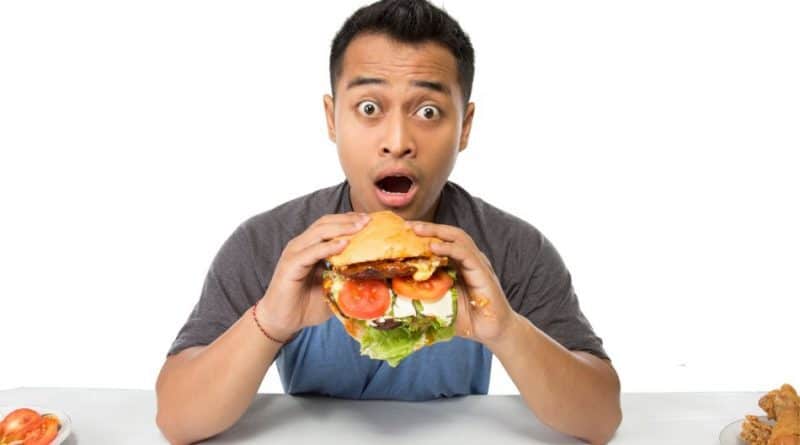Emotional Eating: Don’t Fall Victim and Pack on the Pounds
There are a lot of things that run through people’s minds. You have the stress of people worrying about money. You have kids running around your house all day long. You have stress about work. All of this stress and mental exhaustion can lead to emotional eating or stress eating. And we all know what emotional eating leads to… excess weight gain.
Disclaimer: This article is for informational purposes only and is not meant to treat or diagnose any condition. It is recommended that you speak with your doctor before starting any exercise program, changing your daily nutrition, or adding any supplements to your regimen.
Table of contents

What Is Emotional Eating?
Emotional eating is the practice of consuming food in response to feelings rather than physical hunger. It involves eating as a way to cope with emotions such as stress, boredom, sadness, or loneliness. This behavior is often triggered by negative emotions, but it can also occur in response to positive emotions like celebration or excitement.
Here are some key aspects of emotional eating:
- Triggers:
- Stress: High-stress situations can lead to increased cravings for comfort foods.
- Boredom: Eating to pass the time when there’s nothing else to do.
- Emotional distress: Feelings of sadness, loneliness, or anger can prompt eating.
- Celebrations: Happy events and social gatherings can also lead to overeating.
- Food Choices:
- Emotional eaters often crave high-calorie, sweet, or fatty foods like chocolate, ice cream, chips, and fast food.
- These foods are often referred to as “comfort foods” because they provide temporary relief from emotional discomfort.
- Consequences:
- Physical: Weight gain, digestive issues, and an increased risk of chronic diseases like diabetes and heart disease.
- Emotional: Feelings of guilt, shame, and further emotional distress, creating a vicious cycle.
- Behavioral: Developing unhealthy eating patterns and dependency on food for emotional regulation.
- Differences from Physical Hunger:
- Onset: Emotional hunger comes on suddenly, while physical hunger develops gradually.
- Cravings: Emotional hunger often leads to cravings for specific comfort foods, whereas physical hunger is more flexible.
- Mindless Eating: Emotional eating is often done mindlessly, without paying attention to the amount or type of food consumed.
- Satisfaction: Emotional hunger is not satisfied once full, and more food may be consumed even when not hungry.
Emotional Eating Is A Real Thing
Some people think emotional eating is fake and it’s just people’s way of making an excuse for poor nutritional choices. However, emotional eating is a real thing and it can affect anyone. In fact, right now it’s growing by the day in America.
Those days or nights where you’re overly stressed, you can find yourself searching high and low in your pantry for something salty, sweet, fatty, or generally unhealthy. And while the first step to correcting the situation would be to better manage your stress levels and emotions, that’s generally easier said than done.
And the fact that people have been stocking up on food means there’s more food around you to nibble and snack on. Most people aren’t measuring out their food throughout the day, they are grabbing a handful of chips or pretzels and then chasing their kids around the house. That one or two drinks per night are turning into a six-pack (and not the good abdominals one) or multiple pours of bourbon. Before people know it, the number on the scale starts creeping up.
People Are Stocking Up on Food at Their Home

I was looking at some Nielsen data for the US and it was YOY through March 21, 2020. Food consumption has gone up dramatically in various categories. For instance, beans are up 237%, rice is up 234%, pasta is up 228%, soup is up 237%, baking yeast is up 647%, canned meat is up 282%, fresh meat alternatives is up 454%, fresh meat is up 100%, processed meat is up 127%, milk/dairy is up 86%, butter is up 127%, oat milk is up 513%, and surprisingly, ice cream is only up 50% (I expected this to be MUCH higher). Sure, some of these increases are due to panic-buying and hoarding, but nonetheless, these are some dramatic increases.
More and more people are shopping for the necessities and getting in and out of the grocery store as if the place was on fire. They don’t want to touch anything, they don’t want to browse the aisles, they just want to get what they need and get home. This has hurt many newer brands as trial has decreased since people aren’t browsing and taking time to look at labels. People are buying products and brands they are familiar with and getting out.
Related Article: Unlocking The Sattvic Diet — An Ayurvedic Guide To Wellness
A survey was conducted by Brick Meets Click/ShopperKit Online Grocery Shopping Survey that found 31% of US households have been using either a pickup grocery service or an online grocery delivery service during this Coronavirus scare. Many people don’t want to go to the grocery store in fear of getting the virus. And of this number, 26% mentioned this is the first time they have been using such grocery services. 43% of the people surveyed mentioned that even after this whole Coronavirus thing passes that they will continue using these services. And let’s face it, they’re convenient and that seems to be the way things are trending these days.
How Can You Prevent Emotional Eating?
With emotional eating, it’s not like the normal hunger you feel during the day. Emotional eating hits you like a ton of bricks and even when you become full, you still aren’t completely satisfied which causes you to continue eating. The key to helping prevent emotional eating is to find the source and redirect your focus onto something productive to prevent you from reaching for food as the answer.

Here are some tips to consider to keep your mind and body active to help prevent emotional eating:
- Awareness:
- Recognize the difference between emotional and physical hunger.
- Keep a food diary to track eating patterns and emotional triggers.
- Alternative Activities:
- Find other ways to cope with emotions, such as exercise, hobbies, or talking to a friend.
- Practice stress-relief techniques like deep breathing, meditation, or yoga.
- Healthy Eating Habits:
- Establish regular meal times to maintain a balanced diet.
- Choose nutritious foods that provide lasting energy and satisfaction.
- Professional Help:
- Seek support from a therapist or counselor to address underlying emotional issues.
- Consider joining a support group for emotional eaters.
Click here to continue reading…


*Disclosure: This article may contain affiliate links or ads, which means we earn a small commission at no extra cost to you if you make a purchase through these links. These commissions help support the operation and maintenance of our website, allowing us to continue producing free valuable content. Your support is genuinely appreciated, whether you choose to use our links or not. Thank you for being a part of our community and enjoying our content.
PLEASE CONSIDER SHARING THIS ON YOUR SOCIAL MEDIA TO HELP OTHERS LEARN MORE ABOUT THIS TOPIC.





